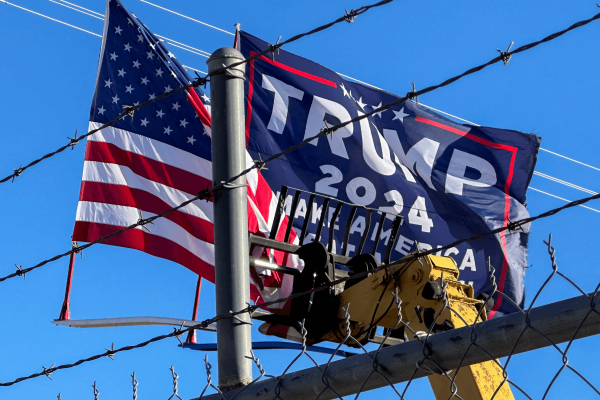This interview is part of The Reconstruct, a weekly newsletter from Sojourners. In a world where so much needs to change, Mitchell Atencio and Josiah R. Daniels interview people who have faith in a new future and are working toward repair. Subscribe here.
A few weeks ago, a friend forced me to listen to a This American Life episode about the presidential election. The act that stood out to me most in “This Is the Cake We Baked” was about President-elect Donald Trump’s plan to deport between 15 and 20 million people.
Then, in an interview with NBC’s Kristen Welker on Dec. 8, Trump said that his administration will begin deporting undocumented immigrants with criminal backgrounds and then expand to “people outside of criminals.” As ominous as that last clause is, Trump made it clear what he meant when he responded to Welker’s question about what he would do in a situation where a family was composed of people with mixed legal status: “I don’t want to be breaking up families. So the only way you don’t break up the family is you keep them together and you have to send them all back.”
For a long time, I’ve wondered how, on a practical level, something like mass deportations would work. Specifically, I’ve wondered how churches providing shelter to immigrants will respond if and when Immigration and Customs Enforcement agents show up to deport people seeking refuge. What can faith communities, activists, and people of conscience do to tangibly help immigrants right now?
To help me answer this question, I spoke with Omar Angel Perez, who works for Faith in Action, a non-partisan organization that is dedicated to helping congregations address issues of injustice on both a local and national level. Perez focuses specifically on issues of immigration justice, and he sat down to talk with me about mass deportations, Latino support for Trump, and the need to reframe the immigration conversation.
This interview has been edited for length and clarity.
Sojourners, Josiah R. Daniels: Who are you and what do you do?
Omar Angel Perez: I’m the director of the immigration justice program at Faith in Action. Faith in Action is an international faith-based network. We have a presence in at least 40 places within the country, but we also have a presence in Mexico and Central America. We have an affiliate in El Salvador. We also have a presence in Haiti and some parts of Africa.
And the organization is not exclusively Christian, right?
We are a multi-faith-based organization, from different expressions of Christianity to including other faith traditions, Muslims, indigenous traditions as well. I was raised as a Catholic. I’m an immigrant from Oaxaca, Mexico. I’m indigenous Zapotec, so I do not practice necessarily, but I observe certain traditions.
As someone who works with immigrants — both people who have the appropriate papers to be here but also folks who are undocumented — what should we expect when it comes to the second Trump presidency?
I think it’s very clear: We’re talking about a person that we should take by his words. We witnessed his first administration, and we know what he’s capable of. This time around, just looking at who he’s appointing to his Cabinet, we know they are talking about this: They’re talking about conducting mass deportations, workplace raids. It’s going to be very disruptive. And we know that we are in a moment where faith leaders, of all faith traditions, have a moral call to play in this environment.
And all faith traditions, in moments like these, should stand with those who are in pain. In this case, migrants, undocumented migrants, people of color, LGBTQ+ people, women — especially Black women — are going to be targeted by the decision that this person [Trump] is going to make.
And this is a moment of truth, right? Faith communities, and especially faith leaders, have a very important role to play when it comes to not only protecting the communities who are going to be targeted, but also speaking the truth and keeping elected officials accountable.
One of the things that ICE has not done in the past, but some experts are saying they may do, is raid church communities providing sanctuary to immigrants. What advice might you give faith communities to prepare for such a scenario?
What we’re hearing from our base, affiliates, and congregations … is that they’re going to stand for the rights, and they’re going to protect communities, to work with communities even if they are targeted.
They’re going to put themselves on the line. We at Faith in Action, along with other faith-based and non-faith-based organizations, we’re getting ready to provide the resources for that and make sure that they know what they need in order to do that.
In February, I reported on a church that had become an impromptu shelter for immigrants. One of the things I am wondering is when Jan. 20 hits, are there going to be buses that go to this church to pick up these folks who are seeking asylum status?
In such a scenario, what does it look like on a practical level to protect the folks there?
We are seeing places where cities, mayors, governors are saying, “We are not going to collaborate with ICE.” So, that’s important. And in a given case, if a congregation is targeted, my recommendation to that congregation is that they should be having conversations now — with the local communities, local partners, and elected officials.
I think it’s a moment also to build those relationships and build their base, look at what resources they might need. Because even when a raid happens, that doesn’t mean that everybody is deportable. They need to go case-by-case. And so there are resources out there they can look at, but they need to do the work now. They need to get ready.
For my whole entire life, I have been hearing that we have to “fix immigration.” Obama comes along, he creates the Deferred Action for Childhood Arrivals program, we think, “Okay, this is maybe going to solve some of the issues.” Of course, Trump and the Republican party, they push back hard against that. Immigration is still broken in this country.
How do we reframe this conversation in a way where we are putting human beings first and foremost? How can we work to figure out solutions instead of digging into our respective positions?
It’s a question we need to wrestle with. It is true that the immigration system is broken, but we need to look at who benefits from a broken system. And we need to look at the economic implications.
I think that we need to change the narrative about immigration. Just this morning, I was talking with leaders and organizers from the border area, and what they were saying is we need to change the narrative and our approach about the border. When we talk about the border, we talk about it from the perspective of security. And we forget about all these other stories of people living in the border area and their contribution to the economy of the country, their contribution to the economy of the local communities. So, I definitely think we need to approach that conversation from the lens of humanity and inclusion.
So far, what we see is the mass media and elected officials from all sides repeating this language of order, the language of criminalizing immigrants. We need to change that dynamic. We need to change that narrative. And I think communities of faith are well positioned to change that narrative.
What are some instances that you know of where people have changed their minds about immigration?
I’ll tell this story about a young clergy who came from a Republican family. I don’t know if she’s still a Republican or not, but she identified as a Republican eight years ago, and while we were doing all the community defense work, sanctuary work — and I think it was out of curiosity — she started approaching congregations doing immigration work. And she ended up being very involved in the rapid response, essential work, to the point that she was part of one of our “rap response” teams who helped one of our leaders, who was targeted by ICE, and literally dropped her from her house to the sanctuary congregation where she took refuge.
I think when we approach the topic from the lens of humanity, that’s when change happens. And it is important to have those one-to-one conversations to understand each other’s history because we have a lot in common. But we don’t realize that.
There seems to be support among a segment of Latinos for Trump. In “This is The Cake We Baked,” Puerto Ricans are organizing for Trump, and this is after a comedian at a Trump rally referred to Puerto Rico as “a floating pile of garbage.” What do you think about the support Trump is receiving from some Latinos?
I was in a meeting with a group of leaders the other day, and this leader reacted to that — and I’m going to repeat her words here — she said the reality is that neither party has done anything for immigration.
The reality is that we went through the last two administrations. First, the Trump administration directly attacked our communities, and then Democrats came to power, but they didn’t do that much. Actually, the deportations continued. That’s a reality. What conversations are we having with our communities? That’s one point.
The other point that she made, which was true, is that when Latinos went and voted for Trump, they were thinking about economics. I believe that Democrats need to think about what’s the message to the community and how they are working with the community. The reality is that we look at the Republicans, we look at the Democrats — is our situation better in terms of immigration? Probably not.
There is a position among some immigrants that goes something like this, “We came to this country the right way and our expectation is that people do the same.” What do you make of that?
I think they don’t understand the history of this country. And they aren’t looking at the contributions of the immigrant community or immigrant communities to this country — culturally, politically, socially, and economically, right? It’s a narrative that is going on there that has been absorbed by some sectors of the immigrant community itself.
We were talking earlier about narrative, right? This is a narrative that we need to deconstruct. I think if we see the constituent of the labor force in this country, especially in certain industries, we’ll see the big role immigrant communities played in that.
That’s what people don’t see. They are not approaching this from the perspective of humanity, right? They also don’t realize how the immigration system works. I’m an immigrant. It took me years to get my documentation, and there are a lot of stories like that. People say, “Why don’t you just get in the line?” You get in the line, you wait 15, 20 years. “Why don’t you just get your papers?” Because the system is broken. And the system is purposely broken. It’s easy for somebody who has benefited from coming to the country with a visa to not recognize how the system works and all the other reasons why people come.
One thing that we’ve been pushing for is safe ways for people to enter the country. One of the things that sectors or communities are pushing for is for this concept of circular migration. If people can come here with a working visa, they can work, go back to their countries. People are not necessarily going to stay here. We need to look at who benefits from keeping the system as it is right now.
How do we combat and correct some of these narratives?
There is a lot of misinformation going out there, especially in faith communities. I think we need to have these difficult conversations with our people, with everybody, right? From a faith perspective and from the perspective of love. And open our minds to hear from others and learn from others. I think that’s how we need to respond to this narrative.
I’m wondering, in times where you feel that you don’t have a lot of courage, what do you rely on to give you courage?
So, we are a faith-based community, a faith-based organization. First, we have our faith. We have our faith leaders who are guiding us. We have our directly impacted leaders who are guiding us. We have our communities. It’s important for us to be in community in these times. And you don’t need to practice that faith to be in community.
You need to be in close contact with your families, with your friends, to ground and center yourself. Those are the things that people can do without even putting too much thinking on it.
Many communities, many people who are in this country are survivors of violence, wars, and genocides. We’ve been here before, right? We need to look at the lessons from people who were here before us, from communities that were here before us. And we need to take those learnings and put them into practice again.
And we need to keep our eyes on the long term. What’s the future we’re fighting for? What’s the future we’re aiming for? This is our country. And we need to make it a better place to live in. That’s the commitment.
Got something to say about what you're reading? We value your feedback!







